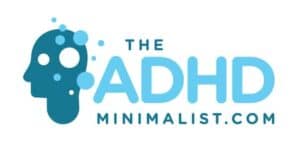
What are the benefits of playing games with children who have ADHD and Dyslexia?
Board games bring families closer together, encourage friendships, teach life skills, lengthen children’s attention spans, and develop the brain.
The amazing side effects of having fun together work for anyone.
Kids with a double diagnosis (both ADHD and Dyslexia) should spend extra time playing games. This is by far THE MOST FUN WAY TO IMPROVE EXECUTIVE FUNCTIONING SKILLS AND ATTENTION SPANS!
There are endless benefits your whole family can enjoy from playing games, taking time to sit down together, putting your phones away, and playing board games that induce laughter are just a few.
If you wish you had time to play more games, make a change today.
Get out your calendar and schedule one evening for your family to play games together. Then stick to it, don’t let excuses get in the way.
We have several different diagnoses in our family.
I am originally from the USA, but I married a Swede and moved to Sweden sixteen years ago.
We make frequent trips to the USA to visit my family, but over the years Sweden has felt more and more like home.
My husband David and I have three kids and live on a farm from 1790. It’s not a working farm, and some of the buildings were in such bad shape when we bought them that we barely managed to keep them from falling down.
Unfortunately, we don’t have any animals yet, but we would like to get chickens soon.
My son Lage (13) has ADHD predominantly hyper and dyslexia.
My daughter Maria (10) has ADHD predominantly inattentive (what was called ADD) and she has dyslexia.
My five-year-old is a bit too young to test for disorders, but she is starting school this fall and it will be interesting to see how that goes.
I (Annie) have dyslexia, and my husband David and I probably both have a touch of ADHD although we were born before it was commonly diagnosed in the 70s and 80s.
ADHD/dyslexia and ADD/dyslexia combinations caused us to take a different approach to game playing at our house.
Often kids with ADHD/ADD also have dyslexia. I wish doctors and researchers would spend more time considering this ADHD/Dyslexia link and researching how it affects kids.
The Benefits of Board Games
1) Kids learn Problem solving skills through games
Games that have the right mix of luck and strategy are perfect for developing problem solving skills.
When a game uses this mix of luck and strategy it simulates real life.
Sometimes we get lucky in life and sometimes we have unexpected setbacks.
Games that help kids think up strategies to get around these setbacks and still come out on top, can help kids develop skills to conquer life’s difficulties.
Games we recommend
Settlers of Catan + expansions, Risk, and Livingstone (works for younger kids as well), are a few great games for improving problem solving skills.
The link below will take you to the Settlers page on the Gamenerdz website.
https://www.gamenerdz.com/catan-family-edition/?aff=78
2) Games Develop Children’s Brains
It’s thought that older kids and teenagers can develop their brains by playing games which require them to be strategic and solve problems.
“Strategy games are useful in helping the frontal lobes of the brain develop.Those frontal lobes are responsible for executive function skills, which include planning, organizing, and making good decisions.” says Beatrice Tauber Prior, Psy.D., a clinical psychologist who owns Harborside Wellbeing practice and is the author of children’s books.
Games we recommend
Strategy games like Risk or Settlers are great for jr high and high school students.
Younger children develop their brains when they play games that challenge them. The brain is always learning, making new connections, and growing.
3) Board games can lengthen kids attention spans
Learning to sit and wait your turn has great social benefits, but it can also lengthen a child’s attention span.
When kids know they are in the game till it’s over even during the boring parts. It helps kids learn that it’s ok to be bored.
It teaches kids that boredom is not long-lived.
In our fast-paced culture full of instant gratification this is an invaluable lesson!
“If your family sits down for a game of Chinese checkers, be sure to complete a full game without everyone checking their phone, asking Alexa to play a song, or turning on the TV for the latest football scores,” Prior Psy.D. says. “Finishing a board game without interruptions will help lengthen the declining attention span of kids in a world filled with digital distractions.”
4) Kids who play games learn new skills.
Preschoolers can work on learning numbers, colors, reading, and taking turns through board games.
When my mom gave the Tenzi game to my cousin’s children she was inspired to use it at school, where she works as a first grade teacher.
The idea was to use Tenzi as a fun way to teach number recognition.
Many teachers know the power of games in the classroom. Add a bit of fun and suddenly kids are learning in leaps and bounds.
Games we recommend
Other fun games that teach useful skills are;
- Color Lotto
- Simple Words Lotto
- Building Language Lotto
- Phonics Lotto, Bingo Lotto
- Yahtzee
- Memory
- Word Memory
- Go Fish
- Dutch Blitz.
The link below will take you to the GameNerds website to the Yahtzee page.
https://www.gamenerdz.com/yahtzee-classic-world-series-of-yahtzee/?aff=78
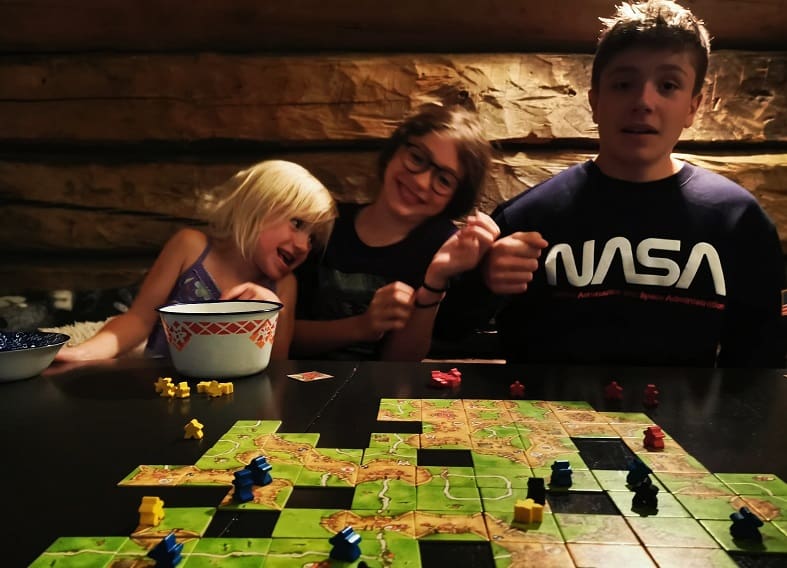
5) Mastering skills that are particularly hard for a child can be made fun through games.
Kids who struggle with reading or math can be helped by playing specific games that target the areas they need to work on.
My daughter, Maria, is ten and still struggles with reading and math. She uses math games on her ipad to improve math skills.
We play games with her, like Yahtzee and Tenzi, to improve number recognition.
Encouraging her to play games with her younger sister is our sneaky way of getting her to play games that help her improve skills, even though they are intended for younger kids.
Often her little sister Frida wants to play memory, or Letter Lotto. Maria thinks she is just being nice to her sister, but the games are benefiting her as well.
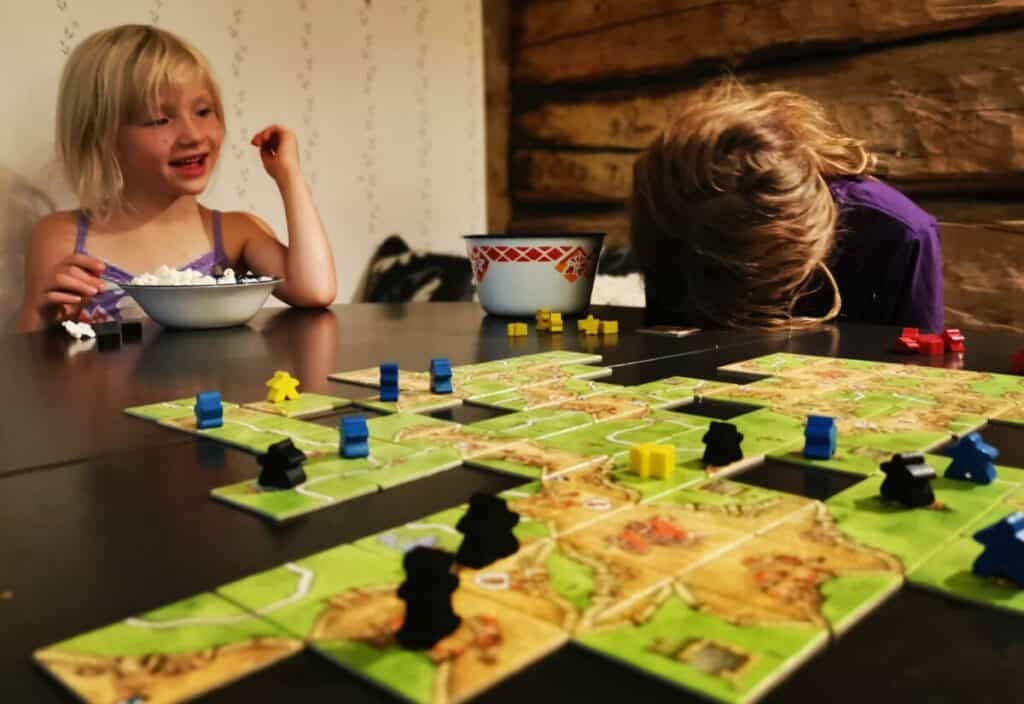
Her ADHD predominantly inattentive (ADD) affects her working memory.
She forgets everyday things like her cousins or next door neighbors’ names.
She can be in the middle of a sentence and suddenly draw a blank! A word that she uses daily is suddenly gone. This happens several times a day.
She does a good job of explaining her way around missing words, but kids her age don’t always have the patience to hear her out.
Some of her forgetfulness can be due to her Dyslexia. It’s hard to know where one diagnosis stops and another starts.
To complicate things further I have been speaking English to her since she was born, but her schooling is in Swedish.
Kids who speak more than one language are usually late speakers and late readers.
In other words no doctor can be completely sure what the exact cause of some of her difficulties is, or if she will grow out of some problems.
What we do know is that playing games is a good way to make sure she doesn’t forget skills that she has already learned, and it helps her improve skills like short term memory.
Her school came up with the idea for Summer Reading Bingo which Maria thought was fun.
They sent home papers at the end of the school year with reading suggestions.
If you do three on each paper and turn them in at the beginning of the new school year, you get your name entered into a drawing for free book of your choice.
It’s incredibly easy to make your own chart. Check out the one I made for inspiration.
Games we recommend
- Memory
- The Math King app
- Draw something app (fun with a little bit of reading)
- Letters lotto
- Tenzi
- Yahtzee
- Reading Bingo

6) Many games help kids with language skills in their mother tongue
Games don’t have to be reading games to help kids with language skills.
Play Simon Says and sneak in some new words!
Games like Hot and Cold where your child asks questions to find an object can help build language skills.
Games that require just a little reading are a great way to sneak some reading into summer vacation.
Most games have cards with only a few sentences on them so kids can practice reading without feeling overwhelmed by a huge instruction manual.
Bingo Lotto with basic words instead of pictures help kids with word recognition.
Seeing the same words several times in a row helps kids remember how to spell them.
Simple story games, for example, when every person in a ring says one word to build a story, are great for language skills.
The Game telephone, where you repeat the same sentence by whispering it in the next kid’s ear, is a good way for kids to practice words verbally.
Games we recommend
- Simon Says
- Hot or Cold
- Guess Who
- Basic Words Lotto
- Learnings Letters Lotto
- Build a Story (Everyone says one word)
- Telephone
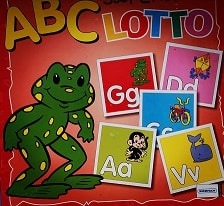
7) Both video games and board games can help kids learn a new language.
Even though this post is mostly about board games, I feel the need to mention that many video games/Apps promote english language skills.
I know my son’s vocabulary has grown through playing video games that require lots of reading.
Although Lage has heard English spoken at home since he was a baby, because he lives in Sweden, his Swedish has always been a bit better than his English.
Playing video games that required reading English greatly improved his English vocabulary. Lately, he says he prefers to read chapter books in English.
If you have kids that are learning a second language order games in that language (Both board games and video games).
Make sure that it doesn’t require advanced language skills, if your child recently started learning the language it needs to be on the right level.
You want to encourage them and make the new language fun not discourage them from the get-go.
8) Board games can bridge gaps between kids
When my daughter who has ADHD predominantly inattentive (ADD) was struggling with friendships, games helped her play with others, within the boundary of a standard set of rules.
When free play, which required role-playing, was frustrating for Maria, she had trouble connecting and playing with friends.
She wouldn’t just go along with what her friends wanted to play when she felt it didn’t suit her.
The fact that she refused to compromise caused problems. She often whined and argued about what to play until her friends lost patience.
I found that getting a game out was often a lifesaver.
Because there are rules in games everyone knows what to expect.
Knowing what to expect, cut down on arguments and in the long run it helped Maria begin to take part in less-structured play with her friends.
After they had played a few games and warmed up to each other they could usually find some common ground to decide what to play next.
Games we recommend
- Ker Plunk
- Connect four
- Pirate Plank Lego game
These are a few games that Maria felt ok about playing with a friend and they didn’t need to ask me for help.
9) Games which require several players, teach Social Skills
Games teach social skills
- Waiting your turn
- Being a good loser
- Teamwork
- Teaches kids that it can’t always be me, me, me, me FIRST!!!
Teachers who use games in the classroom can teach subjects like math or reading and strengthen relationships within the class at the same time.
Games we recommend
- Pictionary
- My kids like to play Blokus with two or four players
- Family Feud can be a great classroom game if you write your own questions about science or history
These games can be played by children in the first few grades at school.

10) Playing games brings families and friends together
Games bring people closer together and help families work on relationships without digital distractions (If you can all put your phones away before you start!).
Games are a great way to build an intergenerational bridge.
I know my kids had many fun chess games with their Swedish grandpa. He taught them to play chess and had the patience to sit and play while the kids were learning and making mistakes.
Many games give rise to opportunities for deep conversations, or fun and silliness which strengthen relationships.
Sometimes getting out a game reminds older kids that it is fun to be part of the family.
Many teenagers want to spend insane amounts of time in their rooms, on line, or with friends.
If you can make a habit of family game night often you can spend time with your teens without awkwardness.
If you have an entire evening to play games, you also have an entire evening to talk, laugh, and connect.
Just putting phones and headphones down, turning off ring signals and computers for an hour of game playing can do today’s tech-saturated families a world of good!
Games we recommend
- Chess
- Mickey Mouse Chess
- Skip-bo
- Chinese Checkers
The link below takes you to Gamenerdz Mickey Mouse chess page. The Mickey Mouse chess pieces make the game extra fun for kids.
https://www.gamenerdz.com/chess-mickey-the-true-original-collectors-chess-set/?aff=78
11) Games can teach us to control our emotions
Board games help us harness our emotions.
It can be a good exercise for highly sensitive kids to deal with emotions evoked by games.
Often it’s easier to deal with negative emotions brought on by losing or doing poorly in a game than it is to deal with negative emotions sparked by not being invited to a birthday party or being called names at school.
Learning to handle negative emotions, when there isn’t as much at stake, can help kids develop the skills to handle harder problems like feeling left out.
Some kids need to work on controlling what comes out of their mouths.
When kids learn that yelling at the winning team does not improve their own chance for success they learn a valuable life skill.
Often smaller children bang on the table or push the game, to destroy everyone’s chances of winning when things don’t go well for them.
Sometimes seeing that a particular behavior causes massive frustration from those involved in the game can be positive peer pressure.
This quickly shows kids their behavior is not acceptable.
Games we recommend
- Settlers of Catan
- Risk
- Carcassonne
These games that have tried our emotions, but are still some of our favorites.
My family loves Settlers! Below you will find the link to the classic Settlers of Catan game and two of our favorite expansions.
https://www.gamenerdz.com/catan-family-edition/?aff=78
https://www.gamenerdz.com/catan-seafarers-expansion-on-sale-add-to-cart-to-see-price/?aff=78
j https://www.gamenerdz.com/catan-cities-knights-expansion/?aff=78
Below you will find a link to Risk the star trek version. This is a bit of fun if you are already tíred of the original version.
https://www.gamenerdz.com/risk-star-trek-50th-anniversary-edition/?aff=78

12) Games encourage laughter
I find that I laugh the most when things go terribly wrong, wrong to the point of being funny, or when I am playing games.
According to Psychology today laughing is good for reducing pain, reducing blood sugar levels, improving job performance, restoring a positive emotional climate, increasing blood flow, offsetting the impact of mental stress, and bringing people into emotional attunement!
If that’s not enough reason to get out a board game or card game and start laughing then I don’t know what is!
Hara Estroff Marano writing for Psychology Today did such an eloquent job of describing how laughter gives relationships a positive boost that I will quote her directly.
‘’Its role in intimate relationships is vastly underestimated and it really is the glue of good marriages. It synchronizes the brains of speaker and listener so that they are emotionally attuned.
Laughter establishes — or restores — a positive emotional climate and a sense of connection between two people, In fact, some researchers believe that the major function of laughter is to bring people together. And all the health benefits of laughter may simply result from the social support that laughter stimulates.’’
Hara Estroff Marano is the editor at Psychology Today, the writer of an advice column Unconventional Wisdom, and the author of the book A Nation of Wimps.
Games we recommend
Some of my favorite laughing games
- Dutch Blitz
- Pit
- Charades
- Rook
13) Communication skills are taught through board games
There are many games that teach communication skills. Often when games are played in teams the team must communicate successfully or they lose.
We have all had the frustrating experience of trying to get a point across to someone without success.
Take that feeling and multiply it by 100. That is how kids with the combined diagnosis of ADD/ADHD and Dyslexia feel when they can’t communicate properly.
My easy-going daughter suddenly started screeching every time she was not understood by adults.
She was 4 years at the time and would scream and yell every time her efforts to be understood failed!
I believe this marked the beginning of her self-awareness.
As she became aware that she could not communicate properly and she didn’t know what to do except scream!
My daughter, Maria, has ADD and Dyslexia. She seems to be affected by these diagnoses mostly in the language center of the brain.
She may always struggle to communicate in words, but I can try to make it easier for her by playing games that build skills and practicing at home where it’s safe to fail.
Games we recommend
- Simpler games like Simon Says teach communication and following instructions.
- Charades teaches communication without using words.
- Any game that is played in teams promotes practicing communication between players.
14) Games teach kids how to follow instructions
One thing that all games have in common is instructions!
If your child has been diagnosed with ADHD and Dyslexia most likely your child will struggle with both written and spoken instructions.
Games are a fun way to work on following instructions, without it feeling boring and tiresome for the child.
Following instructions is a skill that kids will need to navigate adult life.
If they can’t follow instructions they won’t be able to keep a job.
Games we recommend
- Wanna bet
- Piggy Bank Race
15) Impulse control
Games like Jenga and pick up sticks help kids control their impulses.
If they grab the wrong block and the tower crashes down they lose.
Sometimes kids with ADHD have an impulse to crash everyone else’s toy creations.
My son who is 13 still has not grown out of his impulse to crash his sisters Duplo buildings!
I will give him credit for he often asks if he can crash the girls’ Duplo houses, but every once in a while we find a crashed building sight, that no one wants to own up to!
When Lage was in daycare, I would often hear from the ladies who worked him, that Lage had destroyed another child’s toy creation.
He walked right through another child’s Brio railroad track or duplo build again.
Lage seems to live in his own bubble!
Of course the other kids got frustrated and angry with him when their buildings fell down!
He doesn’t seem to understand that he needs to pay attention to his surroundings and control his impulses. – Daycare
Games we recommend
- Pick up sticks
Helps kids work on fine motor skills as well as controlling the impulse to bang the table and move all the sticks when you can’t move just one.
- Jenga
Games Tips for Parents of Kids with ADHD predominantly Hyper combined with Dyslexia and Games.
My son was hyper as a child. He still is hyper, but his hyper-activeness expresses itself in different ways now that he is older.
It’s more like nervous energy that takes on different forms.
When he was little he didn’t have the concentration skills to sit down and play a game.
If he wanted to be included in a board game we would call him to come whenever it was his turn.
He would run off to play between turns. This is ok.
Even if your child is running off when it’s not his/her turn he will learn turn-taking skills from playing games.
Annie Eklöv
Lage doesn’t have extreme dyslexia and although he struggled to read for several years it finally ‘Clicked’ and he now enjoys reading.
He was ten when he started reading more. He is now thirteen and enjoys games that require reading like risk (if the game doesn’t take too long).
Some games may need an imposed stop time, so kids with ADHD/ADD know how long the game will take.
Games Tips for Parents of Kids with ADHD Predominantly inattentive (ADD) combined with Dyslexia.
Things for parents to be aware of when playing games with children who have this combination of diagnoses.
My daughter is ten and a half and still struggles with reading.
When she was tested for dyslexia a couple years ago they found that she had a more extreme form of this disorder.
I can’t expect her to play the same games or read the same books that her brother did at the same age.
Maria likes to play games, but she often insists on being paired up with an adult or older cousin when playing games like Settlers.
She doesn’t often run out of patience for the game or run off between turns, but she doesn’t like to be in a position where she has to read publicly.
I think the pressure of having to read publicly in a time restraint makes her nervous and causes her to shut down and forget words.
Most of the time she automatically passes any cards to her partner who whispers them in her ear, if we are playing an advanced game that requires some reading.
She likes games, and I won’t pressure her to read when we play more advanced games because I don’t want to take the fun out of it.
If you can keep the fun kids will learn anyway.
Tips for Parents of Kids Who have ADHD.
If your child has ADHD you may need to play short games at least to start with.
I suggest picking a game for your child that allows YOU (the parent or adult) to decide how long you will play the game.
If you child has a very short attention span, start with ten minutes, then play the same game every day and increase the time by a minute a day.
This should slowly increase your child’s attention span.
When your child feels the game has become extremely boring, buy a new one or trade games with a friend.
Just remember that it must be a game where the players can adjust the time played.
If you want to play harder games let him/her run off between turns as long as he is in earshot and can easily be called back to take his/her turn.
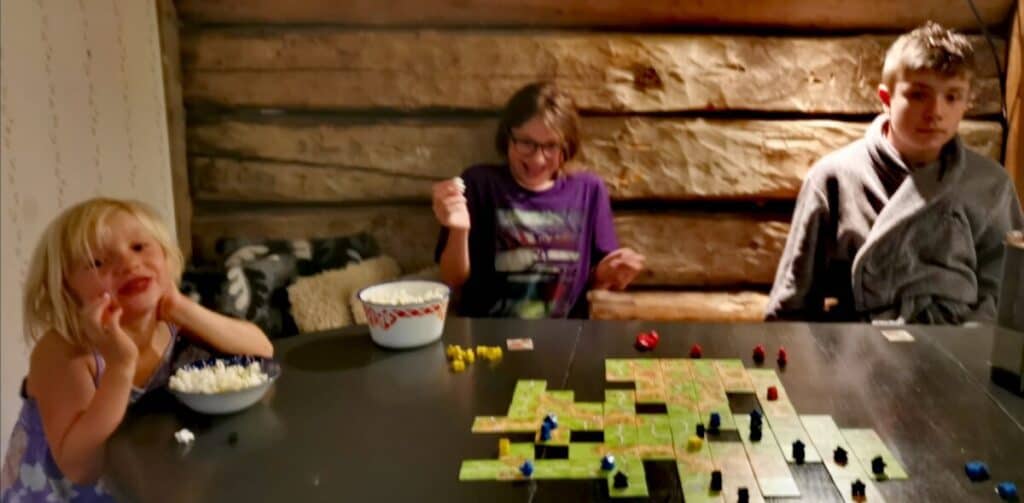
Games Tips for Parents of Kids who Have Dyslexia.
If your child struggles with reading, explain the rules of a new game the first few times you play.
Hopefully, they will soon remember the rules and will be able play with a friend, without the need for adult help.
When you have kids with dyslexia or other reading disorders you have to take into consideration that games which require large amounts of reading will not work for them unless you pair them with an adult.
Some games won’t work at all if they can’t read by themselves.
Gestures is one game that comes to mind. It requires quick reading. We tried this game with Maria and it was a disaster.
If you have an older child who struggles with reading, you can buy a game for younger kids which requires some reading, but doesn’t overwhelm the child.
This is a good way to sneak in some reading that your child won’t find frustrating.
If the game is at their actual reading level but every once in a while adds just a little bit of a challenge then you have found the right game.
A teacher friend recommended different forms of Lotto or Bingo Lotto Like simple words Lotto or Building Language lotto.
I even saw a learning phonics Lotto!
Games we recommend
Other games that require just a little reading are;
- Headbandz
- Charades
- Telestrations
- Basic Settlers.
Conclusion
I hope that this post has given you a deeper understanding of ADHD, Dyslexia, and how games can help.
If you’re like me and you find that some days you completely forget to have your child read, or play learning games then set a recurring alarm on your phone for the right time of day for these activities.
Alarms on my phone are a lifesaver for me, they remind me to give my kids ADHD medications, they get us to activities on time, and they remind me of reading times!
Check my posts about games our family likes to play together despite ADHD, ADD, and dyslexia for some great game tips!
Click below
20 Amazing Games for 7-10 year olds with ADHD/ADD and Dyslexia!
15 Awesome Games for 5-7 year olds, with ADHD and Dyslexia!
10 Games 3-6 year olds, with ADHD and Dyslexia, can play!
If you need some encouragement try reading my post, 16 Positive traits of Dyslexia, A new perspective 16 positive traits of dyslexia, A new perspective
Or 14 Positive traits of ADHD, that I see every day. Fourteen positive traits of ADHD that I see everyday!
Moms (and Dads too) make sure you take care of yourselves!
You need to make sure you are not falling apart, if you are going to properly take care of children with diagnoses.
If you need inspiration read my post , 21 ways to care for yourself while caring for others. 21 ways to care for yourself while caring for others
Check out the WEB STORY I made for this post! Click here Games transform Kids
TO BUY GAMES Click Here http://www.gamenerdz.com?aff=78
For more info and book tips check out OUR Favourite Resources Page Our Favourite Resources
(Source) https://www.psychologytoday.com/us/articles/200504/laughter-the-best-medicine
(Source) https://www.harborsidewb.com/
(Source) https://bpsmedicine.biomedcentral.com/articles/10.1186/s13030-019-0146-3
Copyright Annie Eklöv
